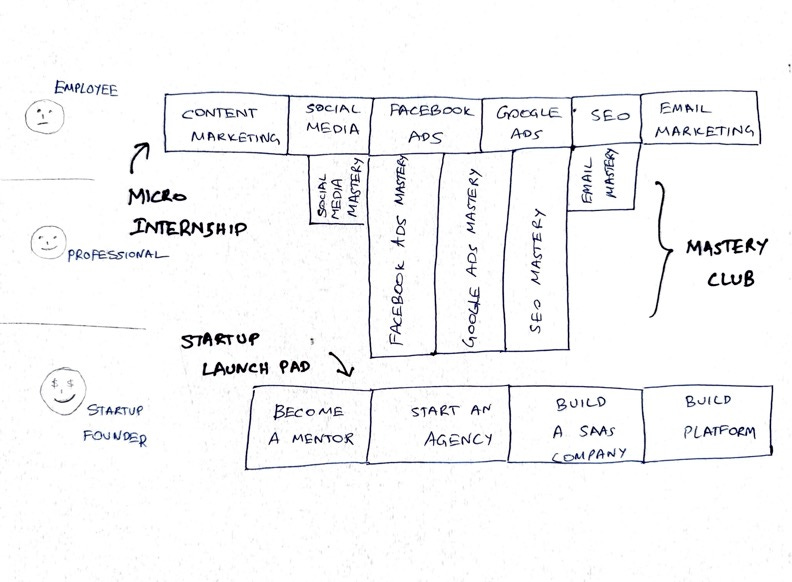MicroStartup - Too Many Things At Once?
Is MicroStartup focused on too many things? Let me explain.
Recently I published a video about MicroStartup and what I am planning to do. In the video, I’ve explained the projects that I am going to do in MicroStartup. It involves education, services, software, and platforms. I have also published a blog post about this.
At first glance, it might look like I am focusing on too many things at once. But I have thought this through and also have taken inspiration from other similar startup studios.
The Agency Needs a Personal Brand
A digital marketing agency cannot scale without a strong personal brand that is seen as the leader of the agency. There are of course agencies that have scaled just with a company brand, but it is increasingly becoming difficult these days because of the sheer competition in the agency space.
Every Tom, Dick, and Harry is claiming to be a digital marketing expert. If you have a LinkedIn profile, you would’ve noticed the barrage of incoming cold messages asking for a call and trying to sell you something. Such cold outreach methods have also become inefficient.
Even if a personal brand is built, it will take a long time to generate inbound interest as an agency from B2B clients. However, a strong personal brand will help in better conversions when you do outreach.
If you are reaching out to B2B clients to sell them a service, getting a foot inside the door will be difficult if they have never heard of you before. Agency owners cannot bank on existing client results alone to get new clients. Agencies usually succeed when there are two co-founders where one is focused on branding and client acquisition and the other co-founder is focused on operations and delivery of projects.
Building My Personal Brand
Building a personal brand is a full-time job in itself and that’s what I will be focused on most of the time. This includes making videos and writing articles along with consuming content from books, courses, podcasts, and in-depth conversations with people in the industry.
MicroStartup Studio has been inspired by Greg Isenberg who runs LateCheckout Studio as a startup studio and from the looks of it, he seems to be focused mostly on content creation. There are different ways creators can monetize their creations.
Some creators choose to build a large audience but in a generic niche (like Joe Rogan) and they monetize their work through partnerships and sponsors. Some creators create content within a niche (like fitness) and sell their own or partner fitness products.
For someone like Greg who mostly blogs about business and startups, his monetization comes from acquiring clients for his startups (Boring Marketing, Dispatch Design, and so on).
He has co-founders and operators for each of his companies. They focus on one thing - their own startup, a child startup of Greg’s startup. I don’t know if all the sub-companies are part of the same parent company or if the sub-companies have separate entities and what kind of equity he gives to each of his co-founders but it doesn’t matter.
He probably structures it the way he sees fit, depending on each co-founder’s values and needs. If it’s just salary and profit share from the operating companies, I presume that it ends there.
Suppose the cofounders or operations are a type of talent that cannot be replaced. In that case, he probably gives equity in LateCheckout, or the child companies are registered as separate entities and they have equity in the startup they are operating.
The Education Funnel
I believe that apart from just creating content for free, I can also create premium content and monetize my creation.
There are three major customer personas I will be targeting:
Micro Internship in Digital Marketing (for people who want to get their first job)
Mastery Club (A collection of mastery courses in digital marketing for people who want to upgrade their career and for people who want to switch to freelancing)
Startup Launchpad: Aspiring and existing startup founders.
The revenue that is generated from these programs will be reinvested into building distribution so that I cement my positioning as a digital marketing expert and a startup expert.
Seeding Deep Marketing With Clients
The personal brand created through my education funnel will seed Deep Marketing agency and client acquisition. I have run an agency before and almost all the clients I converted for my agency came because of my personal brand. Some were inbound, and most were outbound.
The outbound client acquisition efforts yielded fruit because the client had already heard about “Digital Deepak”. Though it is not impossible to convert a client from cold outreach, a brand that is already heard of makes things far less difficult than it needs to be.
I have already identified potential team members who will become operators of my agency. Some will be full time and the rest will be freelancers or partner agencies who will do specific tasks for me.
The agency work will mostly include:
Doing market research for the client creating customer personas
Creating lead magnets for target customer personas of the client’s business
Creating high-converting landing pages for the target customers
Driving traffic to the landing pages
Connecting the leads generated on the landing pages to the CRM
Building a nurture sequence for the leads that enter the funnel
Creating a conversion system through landing page copy and sales closers to convert warm nurtured leads into paying customers.
Because I will have an operations team taking care of the day-to-day operation of the agency, I will be able to invest more time in creating content around what we are doing about the agency as well as the education business. I am reporting to the audience and the audience becomes my manager. That’s the driving force behind MicroStartup as a build-in-public venture.
Investing in Software and Platforms
Education and services can generate good cash flow but they will have limitations on how much it can scale. Education businesses primarily headed by a digital mentor are notorious for not scaling beyond a specific level. I have heard it caps around a few million dollars a year with creators like Justin Welsh pushing it up to $6.8m per year.
Many creators have pivoted from education & services to software & platforms. Starting with education helps build distribution and community. Having a community helps in getting a clear product market fit.
Sam Ovens made millions of dollars with Consulting.com and used the distribution, capital, and understanding of his product-market fit to build Skool.com. He eventually sold Consulting.com to focus 100% on Skool. But when Skool was being built in the early stages, he had to continue running Consulting.com to fund the building of Skool.
Russel Brunson created ClickFunnels through his personal brand and distribution.
Saurabh Bhatnagar from India used the distribution and revenue from his courses to build FlexiFunnels.com (an alternative to ClickFunnels).
I cannot build software or a platform right away because I do not have a capable tech co-founder, the distribution, or the product market fit figured out. I will do it when the time is right.
The education and services wing needs to throw out at least an additional cash flow of $10,000 a month for me to start considering investing in app building. And I’m just getting started from scratch with MicroStartup.





I would go for "Too many things " !! Most Industry verticals would have multiple points at which all of them Unite , intersect or complement when it comes to internal processes and how they plan to operate and especially when it comes to the aspiration numbers - The money making strategies have been and will always the crux and bottom line....which is a uniting fact across all segments , Secondly - pivoting is easier when you can draw creative inferences from a broader experience sets.. An expert juggler can juggle good even with the changing background music rhythm.. Thirdly - The ecosystem is quite fluid and open to cross connections and would get more intertwined in the future..!!